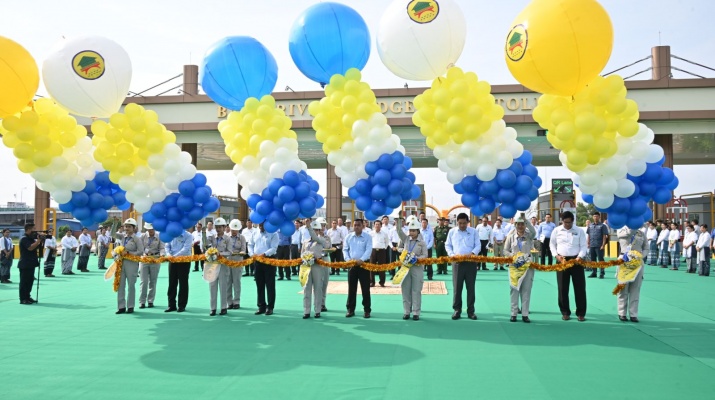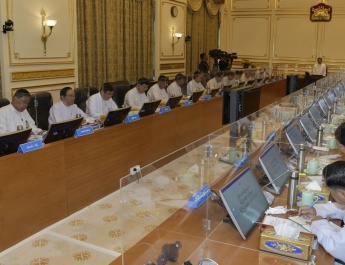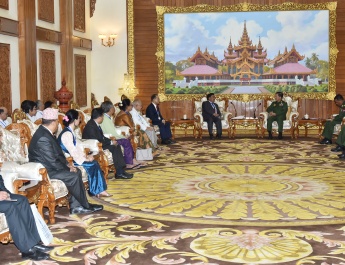Nay Pyi Taw June 8
The opening ceremony of Bago River Bridge (Thanlyin Bridge No 3) in Yangon Region was held this morning, attended by Chairman of State Administration Council Prime Minister Senior General Min Aung Hlaing.
Present at the ceremony together with the Senior General were SAC Joint Secretary Lt-Gen Ye Win Oo, SAC members Admiral Tin Aung San, Lt-Gen Nyo Saw, Mahn Nyein Maung, Khun San Lwin, union ministers, the Yangon Region chief minister, senior military officers from the Office of the Commander-in-Chief, the Yangon Command commander, officials of Construction Ministry, officials of Nippon Koei, a Japanese bridge construction company, and departmental personnel.
On arrival at the venue, the Senior General and party were welcomed by officials. Then the ceremony began and Union Minister for Construction U Myo Thant explained the points of the bridge project.
A documentary movie on the bridge construction project was screened. Mr. Togo of Nippon Koei Company presented the documents related to the project to Director General U Kyaw Kaung Cho of Bridges Department of Construction Ministry.
The Union Minister for Construction presented a gift in commemoration of the ceremony to the Senior General.

In his speech, the Senior General said today was a proud day for the successful opening of the bridge that will improve socio[1]economic condition of Myanmar people as well as an auspicious day for the entire Myanmar including Yangon, the nation’s commercial capital, and Yangon Region.
The 8638-foot long four-lane highway bridge linking Thakayta and Thanlyin townships in Yangon Region was erected with the soft loan granted by Japan International Cooperation Agency. It is a beautiful cable-stayed bridge with a unique design that will be a landmark of Yangon.

A loan agreement for the bridge project was reached in 2017 and the construction began in 2019. Construction and loan support came to a halt due to the political situation in 2021. The project could be restarted only after the repeated negotiations. As there appeared inadequacy in fund provision, the State had to contribute over Ks-46 billion to complete the project. Now, sprinkled scented water on it.
Afterward, the joint secretary and members of the SAC and officials sprinkled scented water on the monument. Then, the Senior General and party posed for documentary photographs to commemorate the opening of the bridge. Afterward, the Senior General and party arrived at the pylon where the bronze plate monument of the bridge is located and unveiled the monument before sprinkling scented water on it.

Then, the joint secretary and members of the SAC and officials sprinkled scented water on it. Then, the Senior General and party passed over the bridge and inspected the completion of the bridge before attending to the needs reported by officials.
The bridge construction project has been implemented phase by phase since 2013 under the agreement between the Japan International Cooperation Agency of Japan and the Ministry of Planning and Finance and the Ministry of Construction and relevant ministries of Myanmar. The four-lane bridge is 8,638 feet long including a 6,663 footlong bridge section and 1975-foot long approach sections, and 75 feet wide with a five-foot wide safe zone on each side.

The cable-stayed bridge of steel box and PC box type has a clearance height of 43 feet over the river and a clearance width of 735 feet and its withstanding weight is 75 tons per vehicle.
As the Bago river crossing bridge (Thanlyin Bridge-3) has been successfully constructed, traffic jams on Thanlyin Bridge-1 can be reduced and development of socio-economic lives of residents of townships in Yangon and Yangon South District including Thanlyin, Kyauktan, Khayan and Thonegwa can be achieved thanks to booming local and foreign businesses in Thilawa SEZ. In addition to development in Thilawa SEZ and Thanlyin, the bridge will contribute not only to development of Mon and Kayin states as it allows travelling to Hpa-an Myawady by using the EastWest economic corridor but also to connectivity with regional countries.

As the bridge has been constructed with high technologies, Myanmar engineers have gained experience in construction of modern bridges while skilled workers were nurtured and job opportunities were created.





